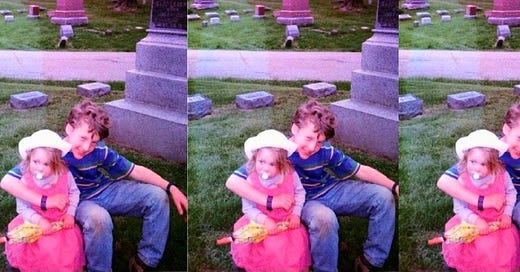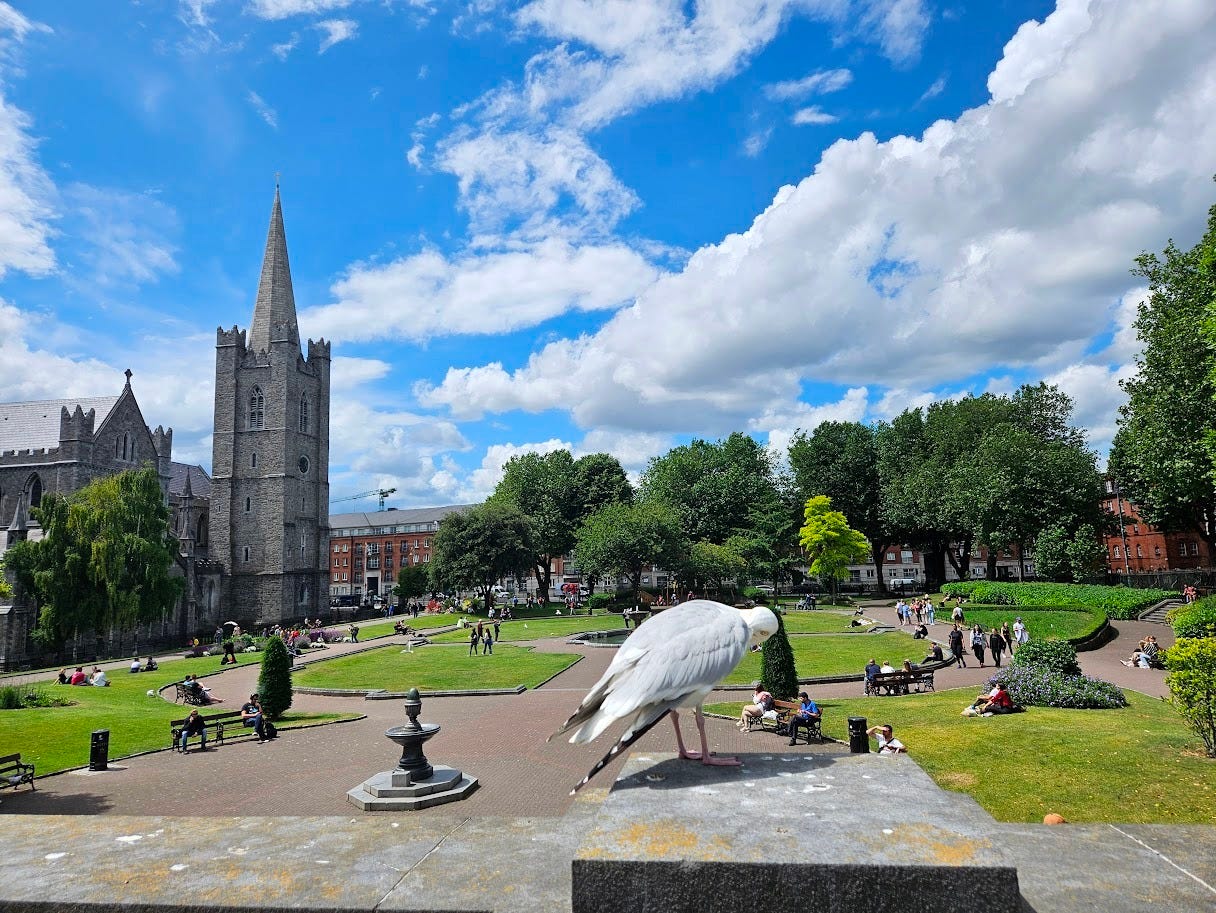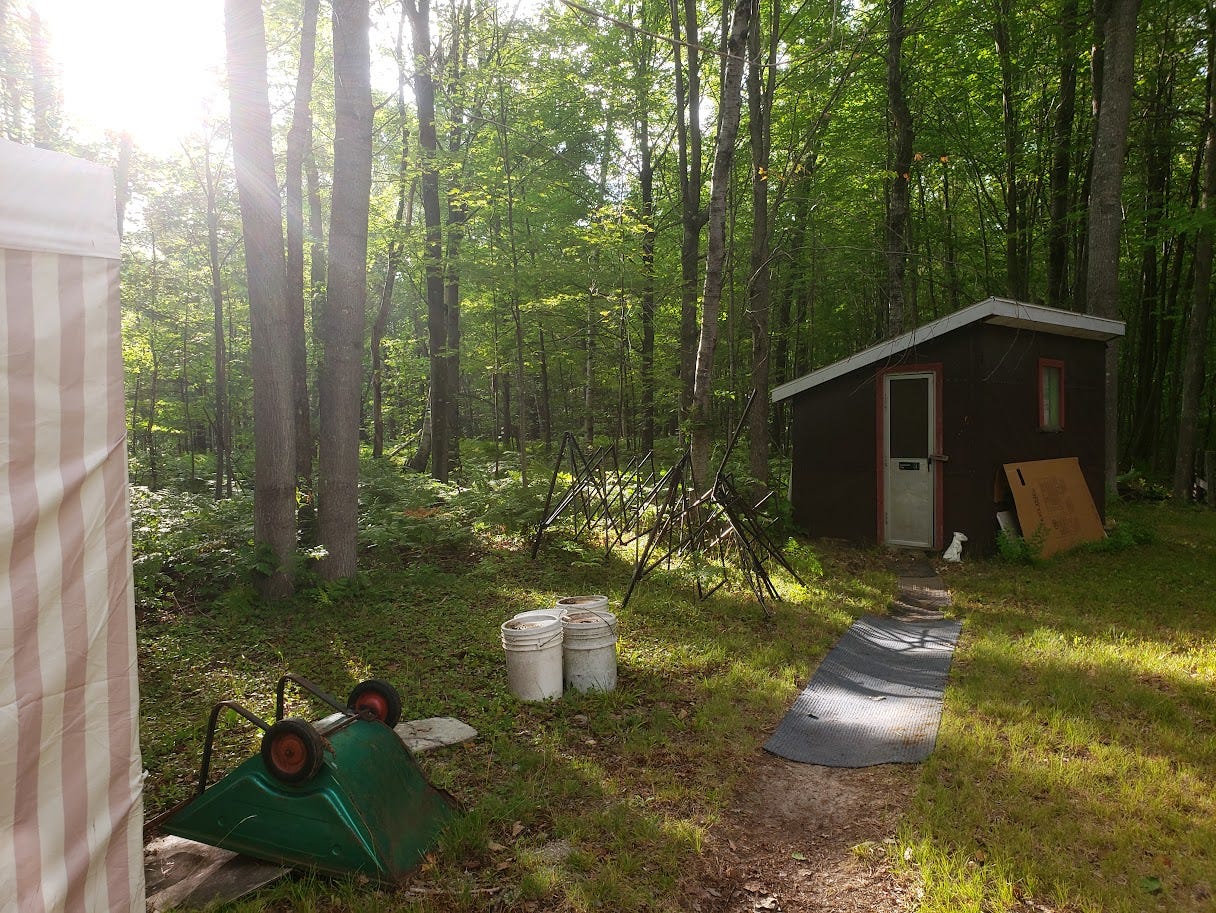Nurture: Exploring the Influence of Seamus Heaney’s “Blackberry-Picking” Through Lyric Essay with Botanical Terms
Or, My Blackberries Were Mulberries
I’m pleased to announce I’m the new poetry editor at and so it felt fitting to write a little bit about a poem that has been on my mind since I read it for the first time in 2018.
Please feel free to listen to the audio recording of the article, which is above, as well.
"Suddenly, walking down a street, be it real or a dream, one realizes for the first time that the years have flown, that all this has passed forever and will live on only in memory..." -Henry Miller, Black Spring
We lived just beyond the mulberry tree, and what I remember most is when the white-green dots transformed into orbs overnight with that deep maroon juice — sticky. The mulberries dangled overhead, weight tugging on their lifeline, stems thinner than a blade of grass. They swayed, with every lazy breeze of almost-summer, until they fell on our dirt driveway. That is, if we — my three siblings and I — left them alone, and we usually didn't have the patience. We were four kids with no cable — there wasn't much else to do except be outside.
That sweet blood of nature was on our hands after one of us, usually my eldest brother, jumped to grab the branches to force the berries down as we'd try to catch them in our mouths, stem and all. Then we’d pluck, one by one, those that didn’t fall. The purple bumps were raised like little mountains on my tongue until my teeth were purple.
I can go days or years without thinking about this. Life just work, everything a routine, my mind on autopilot but I’m brought back to those moments — the mulberry tree that was in the front yard of my childhood home, where I lived until I was twelve or so, and all the outdoor adventures when the sun always seemed high — every time I read “Blackberry-Picking” by Seamus Heaney. It reminds me of my childhood in rural Michigan.
"Late August, given heavy rain and sun For a full week, the blackberries would ripen."
I don't remember the process of mulberries ripening — whether it was after a heavy rain or spring shower. The mulberries would just appear. There. Like the lilacs next door on our neighbor Bob’s property. But even then, though I knew all about property lines, if I could see it, it felt like mine.
“At first, just one, a glossy purple clot Among others, red, green, hard as a knot.”
There’s a thrill when the snow melts and fruit appears.
Seamus Heaney is, of course, one of the most famous Irish poets and, reflexively, I think of Ireland as synonymous with green.
It’s an onslaught of images: green, shamrocks, all the commercialized ideas and alcohol-infused celebration of St. Patrick’s (or Paddy's but not Patty's) Day. But really, blue was the first color of St. Patrick. And that’s the berry you want, no green visible. The color of someone’s father’s leather shoe. Green means stomachaches. The blue-black fruit will be sweetest.
In Ireland, the hills are a rolling green. I’m not as Irish as everyone thinks I am. But drunk men always high-five me on March 17.
Influence—it’s what sparks something. It’s what you need at the time you need it. It helps you create or go into yourself. Heaney has the ability for me to take the poem’s longing and make its nostalgia feel like my own. He has this tremendous ability, even when writing about a place I hadn’t known intimately; it still feels universal.
I didn’t even visit Ireland for the first time until 2023. How do I have such a connection with Seamus Heaney? I don’t, really. This is a stretch, this is me trying.
But it’s not the life, it’s the art—and they are different.
"You ate the first one and its flesh was sweet Like thickened wine: summer's blood was in it"
My you changes and maybe that is my problem. Spastic: my mind, memories, all of it mixing so that the terrible is overturned into beauty only sometimes. Sorrow feeling so sweet in my mouth as everything begins with Remember.
My first you is my family.
My siblings, stated in the birth order that is not-so-arbitrary. Nature was everywhere; really it was all we had. So it was there, in our yard, but our exposure to nature intensified during our summer car rides to visit our aunt who lived alone in the woods in a cabin with no electricity and a bucket for an outhouse.
About an hour north from our town was Harrison, where my aunt lived, and up there (North, but not Heaney’s North) there were blueberries we picked, and strawberries we ate, popping them in our mouths stem and all. I think I was 19 when I learned you were supposed to wash fruit. The dust we kicked up when we ran from patch to patch made us choke.
The long dirt road, with a locked metal gate at the entrance, was my aunt’s driveway. There were low branches that would scrape the paint of our already-scratched car that my father's parents gave us—a car that talked to us when our door was ajar or when we kids, squeezed in the back, tried to unbuckle a seat belt stealthily until its robot voice said please fasten your seat belt. I remember we would crank down the window to put our palm out in the air and feel the wind push back every finger on the freeway. Or, once, my brother managed to fly a plastic kite out the window of the backseat, the flopping diamond more thrilling than the plastic bag one of us would try (and fail) to hold into the wind.
There were so many times were there were no other cars on the road. Traffic was usually nonexistent. The only backup occurred when there was a line of three cars or less, a choice usually, a polite deference so we could slow down for a horse and buggy, Amish Country intertwined with our own this far North.
My mother loved rules and religion. There was right and wrong at home, church, and school, always. But up here, away from the eyes of my father, she relaxed. Up here, we could drive but only here, only at the cabin. Five years old? Seven? Maybe younger— that’s when I got behind the wheel, the bumps under us exaggerated by my slow speed. I had to sit on someone’s lap. We felt everything, tan seatbelt no longer slack, the worn fibers frayed at the end felt like silk as they tickled my neck, tight against it. I begged to drive, but when I was at the wheel, I wished I hadn’t.
Was life easier when I didn’t know how poor we were? Before I learned Head Start was for low-income people, a term only used by those who aren't? I knew our cabin wasn't a cabin like everyone else's. But it was a real cabin, with no electricity, out in the woods, the outhouse containing just a bucket. How camping is supposed to be, we were told. But it wasn’t camping for my aunt, who lived there alone for ten years, on land that was owned by family on my mom’s side. Berries weren’t the only eyes on my aunt. There were also the eyes of strays she took in, the cats and squirrels who watched her. She returned their gaze, but she never looked at the black bear who I saw roaming around only once.
“Leaving stains upon the tongue and lust for/ Picking”
The difference between mulberries and blackberries is that one was mine. Like the feeling when it rains and those who can scatter and so you’re left with the wet, empty streets that curve in and out of people’s lives and for a little bit, you can’t see the bodies that fill the sidewalks in cities, clustered like bees near the hive: important, busy, dangerous if you’re too close.
“Then red ones inked up and that hunger Sent us out with milk cans, pea tins, jam-pots Where briars scratched and wet grass bleached our boots.”
Why is it that the hills of childhood are always green, and the cardinal birds of memory always soar, their blood-red flashes blinding as summer-sun? Lilacs and mulberries stay purple. The sunsets over cornfields are guaranteed to end the day with the silence that comes over the town after the gradual dusk that slowly meets the hay so day and night can maneuver as darkness melts down.
“Our hands were peppered With thorn pricks, our palms sticky as Bluebeard's.”
On the tiny patch of sand we called a beach, my brothers and I dug a hole to the bottom, where there was pavement, no tunnels like we’d imagined. Working all day with those yellow plastic shovels we were unified, tongues to the side. We dug the hole, we built the moat. There was never a castle. The water made the sand turn black as it absorbed our small buckets of water. There was a picture from that day that has been lost. All of us standing in the hole we made, sunburned shoulders a badge of honor.
“We hoarded the fresh berries in the byre.”
“But when the bath was filled we found a fur, A rat-grey fungus, glutting on our cache.”
It hits me—this is about loss, which I automatically equate with death.
I remember—
The playground is filled with rocks that shift underneath us.
There were Xs and Os on the playground, the pieces life-sized to us children, taller than us they seemed, as tall as the teachers who stayed tucked away in classrooms while we ran on chalky rocks just outside their doors, so to reach the pieces, each one a spinning triangle with X, O, and a side blank, we'd have to climb on the nearby steel jungle gym—it was steel then, not plastic—huffing, sweating, and we'd spin the letters around and around until someone shouted tic-tac-toe, the anticipation of the spin more profound than winning.
The playground equipment at my next school was also firm, sturdy stuff. There was a tower so decidedly unlike the yellow spider the girls often had to play on while the boys took turns jumping from the top of the tower, browned in the places hands gripped here before falling. One day, I walked over to watch, the rocks shifting under me with the clinking of power. I must have had a look of wonder or fear—a face that still betrays me as unsure but eager—because the tallest boy dared me. So I climbed. I knew nothing about landing properly, so I just jumped. I don't remember if there was a crack. I don't think I said a word. But I know I didn't cry, just like with any of the four bones I'd go on to break, never a jolt of torturous pain, but instead a subtle, tender throbbing.
My limbs went limp—everything delicate, like a crushed berry. For a few minutes everyone fathered me, my leg still splayed where it had landed. But then the bell rang, the bleating warning to head back inside to class. Everyone scattered except him — my friend in second grade who would die later that year.
“The juice was stinking too. Once off the bush The fruit fermented, the sweet flesh would turn sour.”
And now my you changes again.
I think of everyone I have ever lost, including the people who are still here.
“I always felt like crying. It wasn't fair That all the lovely canfuls smelt of rot.”
It is the permanence of loss that destroys me, that makes the entire thing feel incomprehensible.
In college, I read The Unbearable Lightness of Being by Milan Kundera. Through that book, I read about Nietzsche’s philosophy of eternal recurrence.
But what is a difficult premise to me? For me, it has always been about wanting to relive the past. Is once ever enough? If we only get one shot, why have any? Flowers and fruit bloom and die. But there is a next year, almost always, for them.
Heaney’s use of "always" makes it clear this action, or rather, impulse, is there constantly. "It wasn't fair" is this classic childhood utterance. Kids are obsessed with the concept of justice. (It's too bad that we often outgrow this.) Then, there's a return to the beauty of the berries: "That all the lovely canfuls smelt of rot." This is not just about childhood, nostalgia, and memory but a loss.
Loss is so hard to accept. This, throughout my whole life, has been true. I always want to sob, those childhood impulses still inside me. I’m told that as a baby and toddler, I banged my head on the couch when I was upset. When my mom added cushions, she said I ripped them off to find the wood and crash my skull into it.
“Each year I hoped they'd keep, knew they would not.”
Rot feels like the end of things. But then there's not optimism at the end, but the heartbreaking return to hope: "Each year I hoped they'd keep." He knew, though, they would not.
Heaney uses nature as a proxy for childhood, longing, and loss. I feel myself drawn to nature in a similar way, using it as a way to explore pain, beauty, time, love, and loss— everything that makes us human.
You can read my latest work in Business Insider, where I have contributed writing to since 2023, and you can check out more of my work here.
You can order my poetry chapbook MOTHER OF 0 from Finishing Line, Barnes and Noble, or elsewhere.









very close to the music of what happens
Lovely read. Thank you.